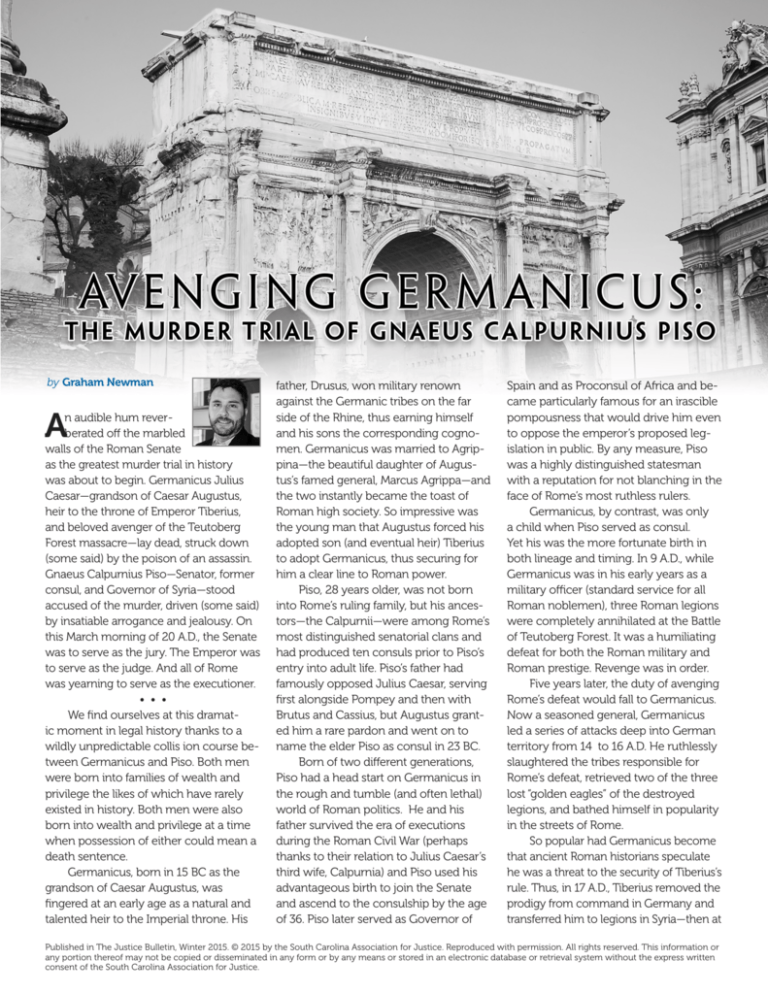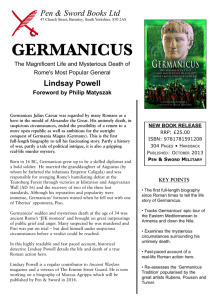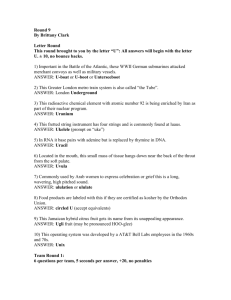
by Graham Newman
A
n audible hum reverberated off the marbled
walls of the Roman Senate
as the greatest murder trial in history
was about to begin. Germanicus Julius
Caesar—grandson of Caesar Augustus,
heir to the throne of Emperor Tiberius,
and beloved avenger of the Teutoberg
Forest massacre—lay dead, struck down
(some said) by the poison of an assassin.
Gnaeus Calpurnius Piso—Senator, former
consul, and Governor of Syria—stood
accused of the murder, driven (some said)
by insatiable arrogance and jealousy. On
this March morning of 20 A.D., the Senate
was to serve as the jury. The Emperor was
to serve as the judge. And all of Rome
was yearning to serve as the executioner.
• • •
We find ourselves at this dramatic moment in legal history thanks to a
wildly unpredictable collis ion course between Germanicus and Piso. Both men
were born into families of wealth and
privilege the likes of which have rarely
existed in history. Both men were also
born into wealth and privilege at a time
when possession of either could mean a
death sentence.
Germanicus, born in 15 BC as the
grandson of Caesar Augustus, was
fingered at an early age as a natural and
talented heir to the Imperial throne. His
father, Drusus, won military renown
against the Germanic tribes on the far
side of the Rhine, thus earning himself
and his sons the corresponding cognomen. Germanicus was married to Agrippina—the beautiful daughter of Augustus’s famed general, Marcus Agrippa—and
the two instantly became the toast of
Roman high society. So impressive was
the young man that Augustus forced his
adopted son (and eventual heir) Tiberius
to adopt Germanicus, thus securing for
him a clear line to Roman power.
Piso, 28 years older, was not born
into Rome’s ruling family, but his ancestors—the Calpurnii—were among Rome’s
most distinguished senatorial clans and
had produced ten consuls prior to Piso’s
entry into adult life. Piso’s father had
famously opposed Julius Caesar, serving
first alongside Pompey and then with
Brutus and Cassius, but Augustus granted him a rare pardon and went on to
name the elder Piso as consul in 23 BC.
Born of two different generations,
Piso had a head start on Germanicus in
the rough and tumble (and often lethal)
world of Roman politics. He and his
father survived the era of executions
during the Roman Civil War (perhaps
thanks to their relation to Julius Caesar’s
third wife, Calpurnia) and Piso used his
advantageous birth to join the Senate
and ascend to the consulship by the age
of 36. Piso later served as Governor of
Spain and as Proconsul of Africa and became particularly famous for an irascible
pompousness that would drive him even
to oppose the emperor’s proposed legislation in public. By any measure, Piso
was a highly distinguished statesman
with a reputation for not blanching in the
face of Rome’s most ruthless rulers.
Germanicus, by contrast, was only
a child when Piso served as consul.
Yet his was the more fortunate birth in
both lineage and timing. In 9 A.D., while
Germanicus was in his early years as a
military officer (standard service for all
Roman noblemen), three Roman legions
were completely annihilated at the Battle
of Teutoberg Forest. It was a humiliating
defeat for both the Roman military and
Roman prestige. Revenge was in order.
Five years later, the duty of avenging
Rome’s defeat would fall to Germanicus.
Now a seasoned general, Germanicus
led a series of attacks deep into German
territory from 14 to 16 A.D. He ruthlessly
slaughtered the tribes responsible for
Rome’s defeat, retrieved two of the three
lost “golden eagles” of the destroyed
legions, and bathed himself in popularity
in the streets of Rome.
So popular had Germanicus become
that ancient Roman historians speculate
he was a threat to the security of Tiberius’s
rule. Thus, in 17 A.D., Tiberius removed the
prodigy from command in Germany and
transferred him to legions in Syria—then at
Published in The Justice Bulletin, Winter 2015. © 2015 by the South Carolina Association for Justice. Reproduced with permission. All rights reserved. This information or
any portion thereof may not be copied or disseminated in any form or by any means or stored in an electronic database or retrieval system without the express written
consent of the South Carolina Association for Justice.
AVENGING GERMANICUS: THE MURDER TRIAL OF GNAEUS CALPURNIUS PISO
the furthest reaches of the Roman Empire.
Simultaneously, Tiberius appointed as
Governor of Syria the insufferably arrogant
Piso. It was an odd decision fraught with
potential for a clash of egos. For the first
time, Germanicus and Piso would meet
in public life, and the stage for our murder
trial would be set.
• • •
The decision to try Piso’s murder allegations within the Senate building had
been made by Emperor Tiberius, himself.
This was a departure from typical Roman
protocol, as Roman trials were typically
conducted in open air fora as a sort of
public spectacle. Occasionally the emperor would preside over trials, but more
typically a “praetor”—a mid-level Roman
official—would serve as judge. Jury
trials had been commonplace for over a
century when the dictator Sulla instituted
the first permanent criminal courts with
jurors to be chosen from members of the
Senate. Here, however, the entire Senate
would sit in judgment of Piso—again,
and extraordinary fact.
But this was no ordinary case. Tiberius shuttered the doors of the Roman
Senate not only in recognition of the
magnitude of the allegations (and the
importance of the victim), but out of
sheer self defense. The streets of the Roman forum were thronged with admirers
of Germanicus calling for vengeance.
Public angst was at a fever pitch thanks,
primarily, to a remarkable public relations
campaign coordinated by Germanicus’s
widow, the beautiful Agrippina.
Germanicus died in Antioch, the seat
of government of the Syrian province.
Before departing for Rome, Agrippina
displayed his naked body to the masses,
proclaiming that blue splotches covering his skin were evidence of poisoning.
Gathering their children and the ashes of
her deceased husband, Agrippina commenced a winding voyage from Syria
to Italy, making sure the news of her
husband’s alleged murder arrived before
she did. Then, spectacularly, she ordered
the convoy to land at Brundisium (modern Brindisi) at the heel of the Italian
peninsula. Agrippina then walked, with
her husband’s ashes, the entire length
of the Appian Way to the Roman capital,
rallying public support and stoking public
anger with each village she passed along
the way of her weeks-long journey.
The evidence of Germanicus’s
murder was varied. As was predicted,
he and Piso hated each other from the
beginning. While Germanicus was supreme commander of the legions of the
east, Piso was his administrative equivalent—at least in Syria. Rome had not yet
become the military autocracy it would
be in later years and thus Germanicus
was forced to rely upon Piso for strategic
support for his military endeavors.
Ever disagreeable, Piso was not interested in promoting the budding career
of Germanicus. The two began openly
feuding over a variety of disputes, firing
off letters to Rome complaining of one
another, and actively undermining each
other throughout the Syrian province.
Then, in September of 19 A.D.,
Germanicus fell violently ill shortly after a
formal dinner in which Piso and his wife
were guests. His suffering was painful, accompanied by terrible stomach
cramps, vomiting, and ultimately blue
splotches covering his body. Bizarrely,
Germanicus’s attendants then claimed
to have discovered evidence of a sort of
witchcraft spread throughout Piso’s gubernatorial residence: disinterred human
remains, cinders smeared with blood,
and the name “Germanicus” scrawled on
lead tablets. This led Germanicus to one
conclusion: he was being poisoned by
some instrument of Piso.
As he struggled for survival, Germanicus ordered Piso to return to leave Syria
Published in The Justice Bulletin, Winter 2015. © 2015 by the South Carolina Association for Justice. Reproduced with permission. All rights reserved. This information or
any portion thereof may not be copied or disseminated in any form or by any means or stored in an electronic database or retrieval system without the express written
consent of the South Carolina Association for Justice.
AVENGING GERMANICUS: THE MURDER TRIAL OF GNAEUS CALPURNIUS PISO
and formally renounced any friendship
between the two men. But the writing
was upon the wall for Germanicus and,
as he died in the halls of his accursed palace, Rome’s most beloved citizen uttered
a curse for the fleeing Piso.
“If my doors, are to be besieged, if I
must gasp out my last breath under my
enemies’ eyes, what will then be the lot
of my most unhappy wife, of my infant
children? Poisoning seems tedious; he
is in eager haste to have the sole control of the province and the legions. But
Germanicus is not yet fallen so low, nor
will the murderer long retain the reward
of the fatal deed.”
Piso was at sea when Germanicus
died in the imperial palace at Antioch.
And despite Germanicus’s conclusions to
the contrary, evidence that Piso had poisoned his rival was limited to the enmity
between the two men and the curious
objects of a sort of Eastern voodoo discovered throughout the palace. But upon
hearing of Germanicus’s death, Piso
swung ‘round his convoy and returned
to Syria intent on seizing control of the
government and the Roman legions in
the absence of Germanicus. Unwittingly,
Piso was also confirming in observers’
minds Germanicus’s predictions of Piso’s
motive for murder.
Piso’s return to Syria was accompanied by great hostility from Germanicus’s
lieutenants as the men felt certain he
was to blame for their leader’s untimely
demise. Rather than attempting rapproachment with these leaders, Piso
responded hotly and raised an army of
mercenaries from the local populace in
order to defend what he felt was his right
to rule Syria. But Piso’s hastily assembled
force wisely declined to fight the seasoned Roman veterans and the Roman
noble was left with no option but to
agree to the demands of the legions: that
he return to Rome post-haste to stand
trial not only for the murder of Ger-
manicus, but now also armed rebellion
against the Roman Empire.
• • •
These were the allegations leveled
against the proud Piso on the March
morning in 20 A.D., as Emperor Tiberius
began to address the Senate much as a
judge would instruct a jury today.
“Piso,” he said, “was my father’s representative and friend, and was appointed
by myself, on the advice of the Senate,
to assist Germanicus in the administration of the East. Whether he there had
provoked the young prince by wilful
opposition and rivalry, and had rejoiced
at his death or wickedly destroyed him, is
for you to determine with minds unbiassed. … “Consider this too, whether Piso
dealt with the armies in a revolutionary
and seditious spirit; whether he sought
by intrigue popularity with the soldiers;
whether he attempted to repossess himself of the province by arms, or whether
these are falsehoods which his accusers
Published in The Justice Bulletin, Winter 2015. © 2015 by the South Carolina Association for Justice. Reproduced with permission. All rights reserved. This information or
any portion thereof may not be copied or disseminated in any form or by any means or stored in an electronic database or retrieval system without the express written
consent of the South Carolina Association for Justice.
have published with exaggeration. …
And I implore you not to take as proven
charges alleged, merely because the case
is intimately bound up with my affliction.”
Tiberius then turned to the lawyers
for both the defense and the prosecution.
“Do you, whom ties of blood or your
own true-heartedness have made his advocates, help him in his peril, every one
of you, as far as each man’s eloquence
and diligence can do so. To like exertions
and like persistency I would urge the
prosecutors.”
With these instructions to advocates and jury, the trial began. Similar to
today’s criminal trials, the prosecuting
attorneys opened the trial with statements to the jury. In this instance, the
prosecutors were close friends and
former lieutenants of the deceased Germanicus—but Romans did not perceive
this to constitute a conflict. The prosecutors presented to the Senate their own
observations of the means by which Piso
undermined Germanicus at every turn
and even attempted to seize control of
the Syrian government and its legions
upon Germanicus’s death. Senators
would rise in anger during the presentations to openly berate Piso, who—as a
former counsel—sat on the first of three
benches which flanked both walls of the
long hall.
Tiberius had given the prosecutors
two days in which they might present
their cases for murder and rebellion. And,
as the second day drew to a close, the ev-
idence seemed clear that Piso had, in fact,
sought to seize control of the Syrian province by force. But the evidence of murder
was scant. The prosecutors had recounted
the physical markings on Germanicus’s
body, the man’s dying blame of Piso, the
strange signs of witchcraft at Piso’s residence, and the enmity between the two
men. But the prosecutors could not place
a vial of poison in the hands of Piso.
In fact, the prosecutors had no witnesses beyond themselves. A suspected
sorceress named “Martina” had been
seized by Germanicus’s champions in
the aftermath of his death. But Martina
died en route to Rome—some said via
suicide, others said via murder. Thus as
the prosecutors rested their case against
Piso, speculation ran throughout the
capital as to whether the public clamor
for Piso’s head would, in fact, be enough
to generate a verdict of “guilty” as to the
charge of murder.
Escorted back to his residence by a
military tribune who served as his guard
during the trial, Piso now had three days
to defend himself from these charges.
His lawyers—seasoned advocates of the
Senate—would surely pull apart the allegations of Germanicus’s associates.
But they would never get the
chance…
• • •
The morning Piso was to begin
his defense, he was found dead in his
chambers. His throat was slashed and a
Roman sword—a “gladius”—was found
next to his body along with what appeared to be a suicide note. But the note
did not admit to orchestrating the death
of Germanicus. “Crushed by a conspiracy of my foes,” Piso’s note began, “and
the odium excited by a lying charge,
since my truth and innocence find no
place here, I call the immortal gods to
witness that towards you Caesar, I have
lived loyally…”. But whether Piso was
guilty or innocent, the prosecution of the
allegations he murdered Rome’s beloved
Germanicus was now at an end.
Never again would the Roman
Senate be the setting of such a momentous trial. But Piso’s trial by jury, Tiberius’s
exhortations of impartiality of the jury
and zealous advocacy of the lawyers,
and the concerns of public influence on
the proceeding have passed down to us
through the ages as a legal heritage. In
cases of public magnitude, the gravity
of such concerns weighs just as heavily
today as it did on that March morning in
20 A.D. v
Graham Newman is an attorney with
Chappell, Smith and Arden, PA in Columbia, South Carolina.
Published in The Justice Bulletin, Winter 2015. © 2015 by the South Carolina Association for Justice. Reproduced with permission. All rights reserved. This information or
any portion thereof may not be copied or disseminated in any form or by any means or stored in an electronic database or retrieval system without the express written
consent of the South Carolina Association for Justice.






